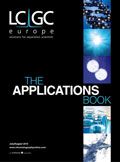Light Scattering for the Masses Effect of Heating on Molecular Weights of Chitosan
The Application Notebook
Heating is a common and essential requirement in most biopharmaceutical production methods. Chitosan is an amino polysaccharide obtained by alkaline deacetylation of naturally abundant chitin.
Heating is a common and essential requirement in most biopharmaceutical production methods. Chitosan is an amino polysaccharide obtained by alkaline deacetylation of naturally abundant chitin. It is known as a potentially beneficial material in many pharmaceutical applications such as tissue engineering, drug delivery, cell encapsulation and medical devices. In this study, we investigated the effect of high-temperature heating on chitosan molecular weights, the most important characteristic of chitosan.
In this study, a GPC-MALS system was used to determine molecular weight. The system employs a Shimadzu solvent delivery system. The solvent (0.2 M acetic acid/0.1 M sodium acetate) was filtered and degassed through 0.22 µm nylon filter under vacumm and delivered to the system. The flow rate was set to be 0.5 mL/min.

Figure 1: Results from chitosan not heated.
Waters Ultrahydrogel 250 and Ultrahydrogel 2000 with the separation range from 103 to 8 × 104 and from 50 × 104 to 7 × 106 kDa respectively were used. The columns were located in a Shimadzu column oven. System temperature was set to be 35 °C. Chitosan solution samples were diluted to a concentration of 2 mg/mL using the solvent, then filtered through 0.2 µm PVDF filters and injected into the GPC columns with a manual Rheodyne syringe injector equipped with a 100 µL sample loop.

Figure 2: Results from chitosan heated.
Two detectors included the Wyatt Optilab (AUX1) and a Shimadzu UV/vis detector (AUX2) operated at 280 nm. The Wyatt DAWN EOS (enhanced optical system).
A value of 0.180 mL/g was used for the refractive index increment (dn/dc). The data were collected and analysed by the ASTRA software. The molecular weight of non-treated chitosan was found to be (1.44 ± 0.009) × 105 g/mol. Chitosan which was heated at 85 °C in an oven for 9 hours had a molecular weight of (7.903 ± 0.038) × 104 g/mol.
High temperature heating, therefore, caused the decrease in the molecular weight of chitosan.
This note was graciously submitted by Hang Thu Ta, Department of Chemical and Biomolecular Engineering, The University of Melbourne, Australia.
DAWN, miniDAWN, ASTRA, Optilab and the Wyatt Technology logo are registered trademarks of Wyatt Technology Corporation. ©2009 Wyatt Technology Corporation 9/11/09

Wyatt Technology Corporation
6300 Hollister Avenue, Santa Barbara, California 93117, USA
tel. +1 805 681 9009 fax +1 805 681 0123
E-mail: info@wyatt.com
Website: www.wyatt.com

A Novel LC–QTOF-MS DIA Method for Pesticide Quantification and Screening in Agricultural Waters
May 8th 2025Scientists from the University of Santiago de Compostela developed a liquid chromatography quadrupole time-of-flight mass spectrometry (LC–QTOF-MS) operated in data-independent acquisition (DIA) mode for pesticide quantification in agriculturally impacted waters.
Investigating 3D-Printable Stationary Phases in Liquid Chromatography
May 7th 20253D printing technology has potential in chromatography, but a major challenge is developing materials with both high porosity and robust mechanical properties. Recently, scientists compared the separation performances of eight different 3D printable stationary phases.

.png&w=3840&q=75)

.png&w=3840&q=75)



.png&w=3840&q=75)



.png&w=3840&q=75)

















